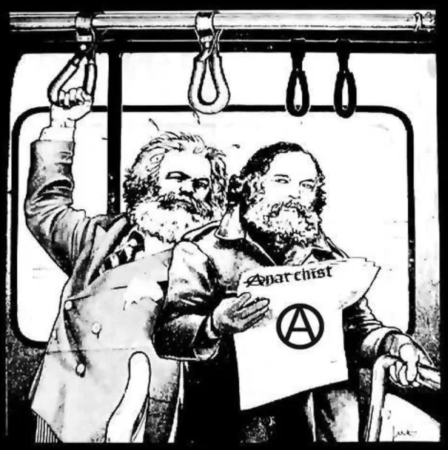Over the course of the last few months, my partner and I did a little reading group. We read Love and Capital: Karl and Jenny Marx and the Birth of a Revolution. It’s a joint biography of Karl and Jenny Marx by journalist Mary Gabriel. Marx was, of course, not too into anarchism. We’ll return to that.
For now, there’s much of interest in Love and Capital. The Marx family was an interesting family, and Gabriel shows the collective, whole family nature of the Marx political project. However, one topic that kept returning to me as I read is the relation between anarchism and Marxism.
That’s not a central topic for Gabriel, but she finds it important to several key moments in Karl Marx’s life. And like many commenters who focus on Marx, she comes down almost entirely on the side of Marxism in any dispute with anarchists. But several events in the book highlighted the conflict again for me. Battles between Marx and Mikhail Bakunin around the First International, in particular.
Anarchism vs. Marxism Today
Some still carry on this feud in the very terms of Bakunin and Marx’s day. Amazingly enough. But often, the disputes now play out as debates between, say, democratic centralism and horizontalism. Or between electoralism and anti-electoralism. In Marx’s day, one might argue the disputes were narrower than these.
As Gabriel presents it, Marx focused on workers’ political organizing while Bakunin focused on action, often violent action. That, however, fails to represent any major philosophical differences between anarchism and Marxism. At least, any in ideological terms.
I don’t want to highlight differences too closely, though. For new leftists, there probably aren’t any so stark that they’d need to choose sides right away. For most anarchists, it’s possible to accept a broadly Marxist reading of capitalism and how to defeat it. At least, they can do so insofar as Marxists focus on workers’ education, class-consciousness, and overthrowing capitalism. In turn, Marxists can set aside certain beefs with anarchists and work together with them on direct action projects.
Differences
All this has its limits. I won’t pretend there aren’t differences between anarchism and Marxism. They differ in their intellectual, social, and political grounding. Anarchism largely deepens and extends certain Enlightenment principles. On that topic, one might read the work of Noam Chomsky and Daniel Guérin, two anarchists who situated anarchism historically. In turn, Marxism owes its heritage to Hegel, continental socialism, and political economy.
They also differ in attitudes toward the state. Anarchists remain skeptical toward it at a minimum, and outright oppose it at a maximum. Almost all Marxists, by contrast, think the working class can and should use the state in certain circumstances.
But leftists often exaggerate these differences. Contrary to the opinion of many Marxists, many anarchists aren’t particularly ‘utopian.’ Many anarchists – from Bakunin to Rudolf Rocker to Guérin – talk about historical stages and revolution in ways that aren’t that different from Marxist uses of these notions.
Organizing a Left
For my own part, I think Marx got his analysis of capitalism largely right. He uncovered the central mechanism through which capitalism seizes value from workers. He also identified the internal tensions of capitalism and the inflection points at which we can fight it. In turn, I think anarchists correctly point out the illegitimacy of most forms of authority and hierarchy. They correctly center the importance of people exercising control over their own lives and collectively managing their workplaces.
And so, I follow both anarchist and Marxist tendencies in my own work. In some ways, this introduces conflict – like conflict over Marx’s call for a ‘dictatorship of the proletariat.’ But in the bigger picture, I think a person can combine anarchism and Marxism sensibly enough.
